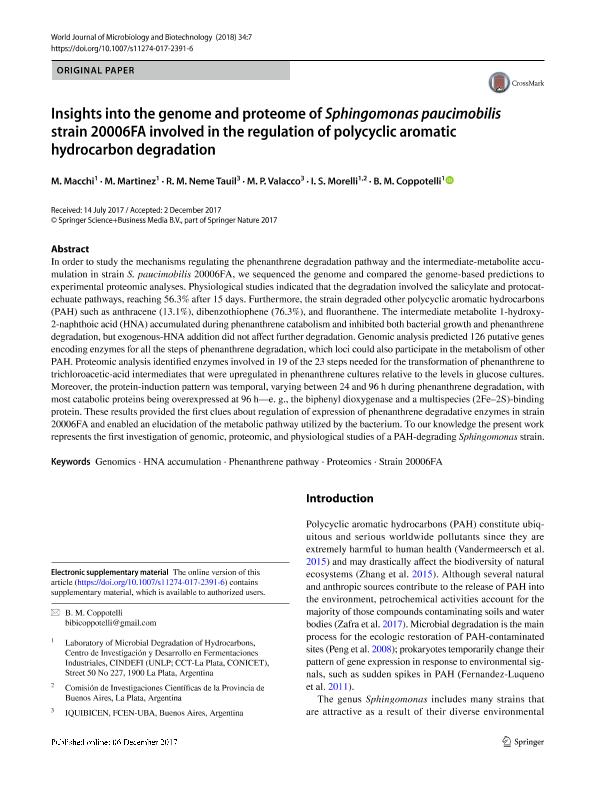Artículo
Insights into the genome and proteome of Sphingomonas paucimobilis strain 20006FA involved in the regulation of polycyclic aromatic hydrocarbon degradation
Macchi, Marianela ; Martínez, M.; Neme Tauil, Ricardo Martin
; Martínez, M.; Neme Tauil, Ricardo Martin ; Valacco, Maria Pia
; Valacco, Maria Pia ; Morelli, Irma Susana; Coppotelli, Bibiana Marina
; Morelli, Irma Susana; Coppotelli, Bibiana Marina
 ; Martínez, M.; Neme Tauil, Ricardo Martin
; Martínez, M.; Neme Tauil, Ricardo Martin ; Valacco, Maria Pia
; Valacco, Maria Pia ; Morelli, Irma Susana; Coppotelli, Bibiana Marina
; Morelli, Irma Susana; Coppotelli, Bibiana Marina
Fecha de publicación:
01/2018
Editorial:
Springer
Revista:
World Journal of Microbiology
ISSN:
0959-3993
Idioma:
Inglés
Tipo de recurso:
Artículo publicado
Clasificación temática:
Resumen
In order to study the mechanisms regulating the phenanthrene degradation pathway and the intermediate-metabolite accumulation in strain S. paucimobilis 20006FA, we sequenced the genome and compared the genome-based predictions to experimental proteomic analyses. Physiological studies indicated that the degradation involved the salicylate and protocatechuate pathways, reaching 56.3% after 15 days. Furthermore, the strain degraded other polycyclic aromatic hydrocarbons (PAH) such as anthracene (13.1%), dibenzothiophene (76.3%), and fluoranthene. The intermediate metabolite 1-hydroxy-2-naphthoic acid (HNA) accumulated during phenanthrene catabolism and inhibited both bacterial growth and phenanthrene degradation, but exogenous-HNA addition did not affect further degradation. Genomic analysis predicted 126 putative genes encoding enzymes for all the steps of phenanthrene degradation, which loci could also participate in the metabolism of other PAH. Proteomic analysis identified enzymes involved in 19 of the 23 steps needed for the transformation of phenanthrene to trichloroacetic-acid intermediates that were upregulated in phenanthrene cultures relative to the levels in glucose cultures. Moreover, the protein-induction pattern was temporal, varying between 24 and 96 h during phenanthrene degradation, with most catabolic proteins being overexpressed at 96 h—e. g., the biphenyl dioxygenase and a multispecies (2Fe–2S)-binding protein. These results provided the first clues about regulation of expression of phenanthrene degradative enzymes in strain 20006FA and enabled an elucidation of the metabolic pathway utilized by the bacterium. To our knowledge the present work represents the first investigation of genomic, proteomic, and physiological studies of a PAH-degrading Sphingomonas strain.
Palabras clave:
GENOMICS
,
HNA ACCUMULATION
,
PHENANTHRENE PATHWAY
,
PROTEOMICS
,
STRAIN 20006FA
Archivos asociados
Licencia
Identificadores
Colecciones
Articulos(CINDEFI)
Articulos de CENT.DE INV EN FERMENTACIONES INDUSTRIALES (I)
Articulos de CENT.DE INV EN FERMENTACIONES INDUSTRIALES (I)
Articulos(IQUIBICEN)
Articulos de INSTITUTO DE QUIMICA BIOLOGICA DE LA FACULTAD DE CS. EXACTAS Y NATURALES
Articulos de INSTITUTO DE QUIMICA BIOLOGICA DE LA FACULTAD DE CS. EXACTAS Y NATURALES
Citación
Macchi, Marianela; Martínez, M.; Neme Tauil, Ricardo Martin; Valacco, Maria Pia; Morelli, Irma Susana; et al.; Insights into the genome and proteome of Sphingomonas paucimobilis strain 20006FA involved in the regulation of polycyclic aromatic hydrocarbon degradation; Springer; World Journal of Microbiology; 34; 1; 1-2018; 1-14
Compartir
Altmétricas



